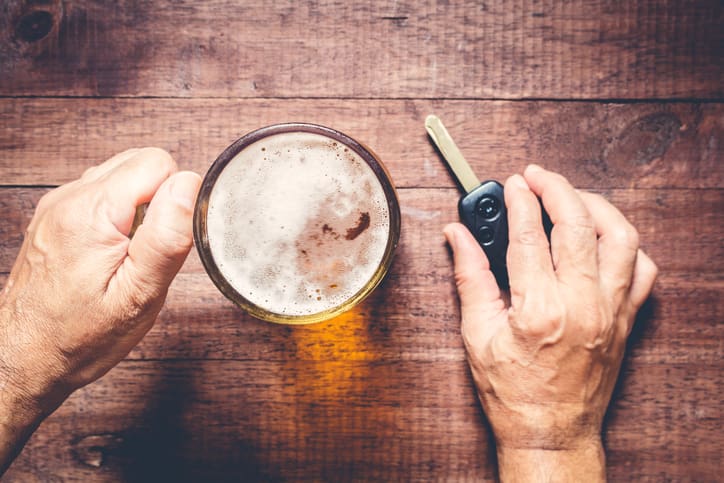Everything You Should Know About California DUI Checkpoints
It’s no secret: drunk driving is a concerning problem in the United States. A report from Centers for Disease Control and Prevention (CDC) exposed the harrowing fact that a daily average of 28 people die in motor vehicle crashes involving an alcohol-impaired driver on roadways throughout the U.S. In other words, every 51 minutes an intoxicated driver is responsible for the death of a fellow motorist. In the state of California alone, more than 10,300 alcohol-related accidents claim the lives of more than 1,000 people annually.Local governments across the country have developed initiatives to help reduce the number of motorists who get behind the wheel after drinking. While things like “zero tolerance” laws, mass media campaigns, and innovative testing technology have been some of the leading strategies in reducing and preventing drunk driving, one of the most effective control methods is random DUI checkpoints. As one of 37 states that legally allow sobriety stops, California authorities conduct more than 2,500 DUI checkpoints throughout the state each year.
This article sheds light on what your legal rights are as a motorist in a checkpoint situation. By being educated about DUI checkpoints, you can be more prepared should you ever encounter one of the common California sobriety stops.

What is a DUI checkpoint?
A DUI checkpoint is a specific location where local authorities stop oncoming vehicles in an effort to identify and detain impaired drivers. While all DUI checkpoints have the same objective—to keep drunk drivers off the road—the pattern in which law enforcement officers pull cars over tends to vary. Regardless of whether officers target every vehicle or stop cars at regular intervals (i.e. every fourth or tenth car), all checkpoints must be highly noticeable, thoroughly publicized, and conducted regularly throughout the year.How were checkpoints developed?
Originally conducted by law enforcement officers in Scandinavia in the early 1930s, DUI checkpoints were first introduced in the United States by the Michigan State Police in 1986. Before Michigan officers could conduct the checkpoint, however, a local resident filed a lawsuit against the State Police claiming it directly violated the Fourth Amendment law which prevents law enforcement from conducting unreasonable searches and seizures. Repeated appeals from the State Police landed the lawsuit in the Supreme Court where, in 1990, Justices ultimately deemed the roadblocks to be legal on the federal level.Despite the fact that these stops were found permissible under the United States Constitution, several state Supreme Court Justices judged DUI checkpoints to be unlawful or in violation of individual state Constitutions and thus illegal for state authorities to conduct. While a majority of states allow police to complete regular sobriety roadblocks, Michigan, Alaska, Idaho, Iowa, Oregon, Minnesota, Montana, Rhode Island, Texas, Washington, Wisconsin, and Wyoming do not.
California has established several hard-lined standards which authorities must abide by if they wish to operate lawfully under the Supreme Court and California Constitution. These guidelines include:
- All operational decisions must be made by supervising officers
- There must be neutral criteria for stopping motorists
- Checkpoints must be conducted in reasonable, highly visible locations
- Adequate safety precautions must be taken throughout the process
- “Good judgment” must be used when determining the checkpoint’s time and duration
- The nature and purpose of the checkpoint must be blatantly obvious
- Detained drivers can only be held for minimal amount of time
- Roadblocks must be publicly and sufficiently advertised in advance
What is the purpose of checkpoints?
Contrary to what some may think, checkpoints aren’t conducted as a means of criminalizing the average driver. Instead, their goal is to identify inebriated motorists and remove them from the road for the safety of other drivers. Furthermore, by publicizing these stops and making them regular occurrences throughout the state, officers hope drivers will think twice about getting behind the wheel after drinking. Though there was initially much doubt surrounding the effectiveness of DUI checkpoints, the CDC’s systematic reviews of 11 high-quality studies have repeatedly found that checkpoints have reduced alcohol-related automobile accidents by nearly 20-percent.
What are your rights as a California motorist?
Unless you can safely and legally change your driving route to avoid police checkpoints, you are required by law to stop your car and comply with law enforcement officers whenever you approach a DUI checkpoint. In order to be legal, these checkpoints must be clearly visible and officers must comply with California’s constitutional requirements. When you’re stopped, you can expect the conducting officers to detain you just long enough to briefly question you and identify any signs of potential intoxication, including:- The scent of alcohol in the car or on your breath
- Slurred speech
- Glassy, bloodshot eyes
- Suspicious body language
In the event you get arrested at a DUI checkpoint, you have the right to speak with an attorney at any time. Know that you’re not required to provide any self-incriminating information to the police nor will requesting to speak with a lawyer reflect badly on you or negatively impact your case.
Call San Diego DUI attorney Bradley Corbett if you’ve been arrested for a DUI or would like further guidance, information, and support in your DUI case.
Bradley Corbett
Bradley Corbett is a criminal defense attorney in San Diego. He graduated from Brigham Young University in Provo Utah in 2004. Later he enrolled at Thomas Jefferson School of Law in San Diego where he participated in a prestigious internship program with the Los Angeles County Public Defender. Since then he has handled over 2,000 cases.

